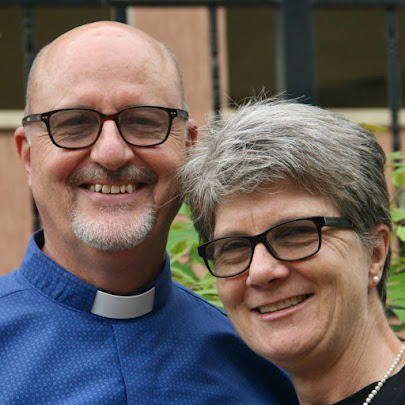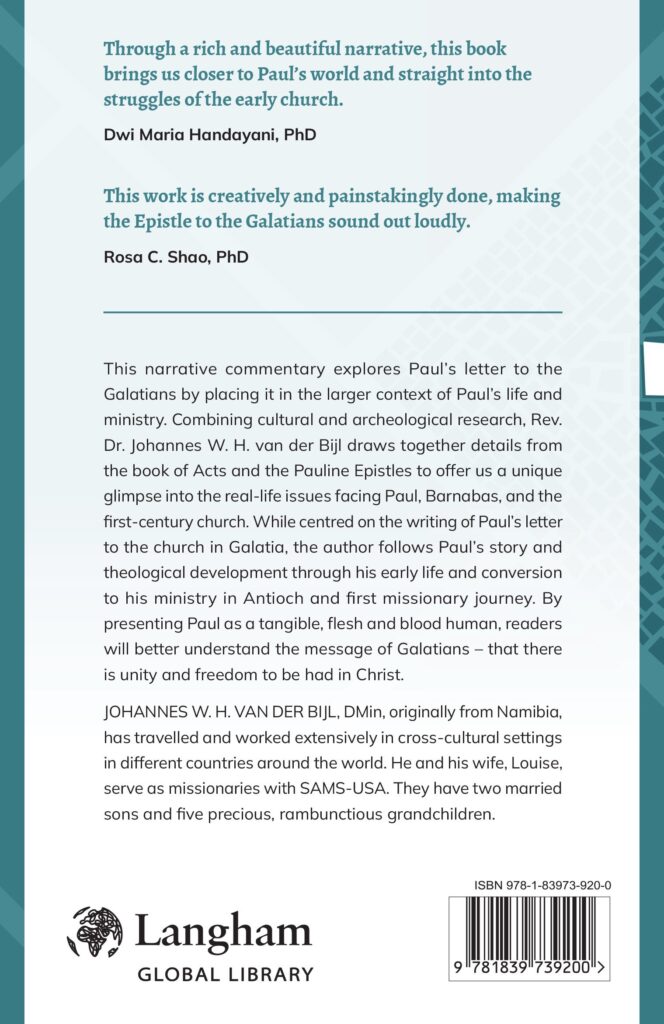 Johannes Vanderbijl is an ordained Anglican priest and SAMS Missionary serving along with his wife, Louise, in the Netherlands, at Christ Church, Heiloo. He has been earnestly writing over the last four years about the life of Simon Peter with two published books to date that have been well received: Breakfast on the Beach (Langham Publishing: 2021) and For the Life of the World (Langham Publishing: 2022). Both books focus on Peter’s ministry of making disciples using Jesus’ four-fold method of discipleship. The books are written chronologically, and Johann situates these early disciples’ lives in the real world, the day-to-day, nitty-gritty of their lived experience.
Johannes Vanderbijl is an ordained Anglican priest and SAMS Missionary serving along with his wife, Louise, in the Netherlands, at Christ Church, Heiloo. He has been earnestly writing over the last four years about the life of Simon Peter with two published books to date that have been well received: Breakfast on the Beach (Langham Publishing: 2021) and For the Life of the World (Langham Publishing: 2022). Both books focus on Peter’s ministry of making disciples using Jesus’ four-fold method of discipleship. The books are written chronologically, and Johann situates these early disciples’ lives in the real world, the day-to-day, nitty-gritty of their lived experience.
What follows is an interview with Johann Vanderbijl about his most recent book, a narrative commentary of Galatians, and how it and his other books relate to discipleship.
Johann, thank you for taking the time to discuss your upcoming book. You are focusing your first in a series of commentaries on the Apostle Paul and his Letter to the Galatians, but you have written it in a narrative style. Why did you choose to start with Galatians, and why a narrative style?
After writing in a narrative style about Simon Peter in my first two books, Langham asked if I would consider writing about Paul in the same manner. I’ll be honest – I’ve struggled with Paul all my life. I saw Paul as the John Wayne of the New Testament: a tough guy who never does anything wrong, a ‘cowboys-don’t-cry’ kind of person, whereas Peter was far more relatable to me—more expressive and emotional—hence why I felt I could write about Peter.
So, I thought, how am I going to approach this with Paul? As I was contemplating and praying, I had the idea: why not tell Paul’s story using his letters chronologically? Thus, I draw from what we are told about Paul in Acts and elsewhere, using anything that could describe Paul at that moment. I incorporate elements from his other epistles and utilize his own language as I compose these books. This volume is the first in a series of commentaries, and Galatians was his initial letter; hence, I chose to start with Galatians.
One aspect of my approach is to portray Paul’s childhood, drawing partly from speculation based on some of his previous statements—that he hailed from a family of Pharisees, came from Tarsus, and was taught by Gamaliel, etc. I piece these details together in a conversational form. Sometimes, for example, he converses with Barnabas, while at other times, I incorporate the leaders of the church in Antioch because they were sent out by the Church there. Therefore, the leaders respond to the news they received from the Galatians about the Jewish Christians who had gone there, demanding that they become Jews before becoming Christians. All of this is presented in a conversational style.
What were some of your key takeaways of Galatians?
I am currently writing on First and Second Thessalonians, which have more of a typical Greek style and structure, whereas Galatians feels like an explosion. It reads like a massive rant; Paul hardly greets them before exclaiming, ‘You foolish Galatians, who has bewitched you?!’ You can sense the emotion, making it a tough book to start with.
I also found that some parts of Galatians don’t flow smoothly because Paul jumps around in his writing. Consequently, I felt the need to fill in some gaps by explaining what he was saying, especially when there was an Old Testament background. In those instances, I would have another character say, “In other words, you are saying…” This approach mirrors other commentaries where a narrator would clarify statements. Since this is a narrative commentary, another character addresses Paul’s statements, shaping how I write it.
As I mentioned before, I always saw Paul as a kind of John Wayne, a super-masculine character. However, I’ve changed my perspective. While I still see him as masculine, of course, I now perceive a lot more emotion from him, especially as I read his other letters. He weeps over those who do not believe, he struggles and longs for Timothy and the Thessalonians. So, my opinion of him has evolved; I now see a much more tender side to this man. The anger he exhibits in Galatians stems from genuine concern for them. It’s essential to remember that Paul was an ancient Middle Eastern man who expressed emotions like rejoicing, and I try to reflect that cultural context appropriately in certain points of the letter.
A narrative style seems very accessible to everyday Christians. Did you have them in mind when you wrote this commentary?
The interesting thing is that when I began writing this, I had oral learners in mind. I thought of places like Gambela (before the Netherlands, Johann and Louise served in Gambela, Ethiopia, where Johann was Dean and Principal at St. Frumentius Anglican Theological College), and other remote areas in Africa. However, it turns out that young Americans have been deeply moved by my narrative books. Some even suggest that Americans are increasingly becoming oral learners, and there seems to be evidence for that.
Here in the Netherlands, people are also reading it because they enjoy stories – they read novels. Whether they believe it is another matter; they may not read the Bible at all, but they will read a story about Peter’s or Paul’s life and ministry.
Another audience I had in mind was those who would never travel to the Middle East. I think of Christians in South Sudan or Ethiopia who, despite their desire to better understand the Bible, are unlikely to travel to Israel, let alone Greece or Rome. Therefore, I wanted to depict Galatians in story form, with as much detail as possible. There are many aspects in the Gospels and the epistles that are specific to certain geographical locations and are taken for granted by Christian authors, making it difficult for someone sitting in Africa to fully grasp. That’s why I endeavor to paint a vivid picture of a particular setting or describe everyday elements like what they might have been drinking, the aroma of cooking, or the light from the burning oil lamp.
You’ve said before that one of your overarching aims in your writing is to help the church to be better disciple-makers. Why does that seem to be such a challenge now, do you think?
Part of the issue is that we’re accustomed to certain methods that no longer yield the same results. We rely too heavily on outdated approaches. The way people engage with truth has evolved. For example, street evangelism in the Netherlands isn’t effective anymore. Here, it’s more of a gradual process. You spend time with friends, discussing mundane topics like the weather or pets. Then, eventually, someone might inquire about your occupation, and that’s when the door opens slightly.
However, you don’t rush in; you proceed cautiously, gradually introducing discussions about faith through storytelling. Why? Because everyone can connect with stories, and it’s less intimidating. I share personal narratives interwoven with Jesus to create opportunities for deeper conversations. It’s about establishing rapport and slowly dismantling barriers. That’s essentially what I aim to achieve in my books and now with the Galatians commentary. They are approachable, readable, and as readers engage with them, they encounter truth in narrative form.
Another factor is the lack of familiarity with Scripture, which is why I write my books – to reconnect people with the Bible through storytelling. However, I believe the issue runs deeper. Many individuals decide to follow Jesus without truly grasping the implications. When we evangelize, our primary focus is often on winning souls, neglecting to convey the profound transformation that following Jesus entails. Jesus frequently emphasized the cost of discipleship to prospective followers. Starting the journey of discipleship on the wrong footing can make the entire journey much more challenging.
It is evident, Johann, that there is a common motivation between your writing and the time you spend with others, wouldn’t you say?
Whether it’s the preparation you invest in writing or spending time with others, it’s all part of a journey. Jesus spent at least three years walking with his disciples before the crucifixion, prompting us to ask: are we truly willing to invest in a small group of individuals until they can replicate our efforts? That’s the essence I glean from the Gospels. Jesus invested time in his disciples, gradually preparing them to carry on his work. It took three years before he felt confident leaving them, instructing them to teach others to do the same.
Paul exemplifies this approach as well. He traveled with disciples like Timothy and Silas, walking alongside them on their journey. Nowadays, however, it often feels more like a microwave process: quick and superficial. We focus on conversions, then pass new believers on to pastors, saying, “They’re your responsibility now.”
In my parish, I’m endeavoring to shift this mindset. I’m teaching parishioners that each of them is a disciple-maker, capable of ministering without constant reliance on the pastor. This aligns with Paul’s emphasis on pastors equipping members to do the work of ministry. The hierarchical model of a professional priesthood has, in many cases, hindered disciple-making. Ordinary Christians are God’s vessels for connecting with diverse individuals. Each person’s journey is unique, requiring tailored approaches to sharing the gospel.
I don’t consider myself special because of seminary training. Anyone can engage in disciple-making if they’re willing to learn how to share their story and the story of Jesus. Therefore, we prioritize training our members in storytelling. In my preaching, teaching, and writing, I strive to present the truth of the gospel through storytelling, encouraging people to walk with Jesus.
Johann, thank you for taking the time to sit down and talk.
Galatians: A Life in Letters by Johannes W.H. van der Bijl, Langham Publishing. Available online through multiple sellers at the end of March.
Johannes and Louise van der Bijl Missionary profile


